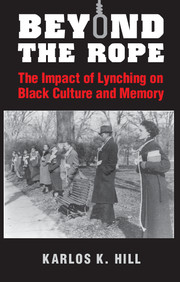3 - If We Must Die
Published online by Cambridge University Press: 05 July 2016
Summary
Black-authored victimization narratives of the lynched black body emphasized how white mobs lynched black Americans with impunity and seized upon the various ways in which white-on-black lynch mob violence dehumanized powerless blacks. In the context of the antilynching movement, victimization narratives aimed to prevent lynchings in the making as well as create national and international political support for federal antilynching legislation. Although victimization narratives were politically expedient, they had limited use for creating a sense of empowerment among black Americans attempting to cope with white lynch mob violence. Consoling narratives of the lynched black body filled this void. In contrast with victimization narratives, which stressed what white lynchers did to black lynch victims, consoling narratives emphasized what black lynch victims did in response to white lynch mob violence. In general, consoling narratives focused on how black lynch victims violently defended themselves against white lynch mob actions and often detailed how black lynch victims killed several lynchers before they were lynched. To be sure, consoling narratives of the lynched black body were not triumphant narratives in which blacks escaped lynching because they fought back. To the contrary, literary consoling narratives of the lynched black body were invariably those in which black lynch victims were brutally murdered by white lynch mobs. However, in highlighting how black characters violently fought back despite the inevitability of lynching, consoling narratives helped black Americans conceive of white-on-black lynchings as expressions of black heroism. Consoling narratives illustrated the ways in which black Americans had conquered the terror, through violent resistance, that white-on-black lynchings sought to inspire. By presenting the transcending of the fear of a violent death at the hands of white lynchers, consoling narratives asserted that blacks were victims of lynching but not necessarily perfect victims of white lynch mob violence. In doing so, the narratives sought to transform white-on-black lynchings from a symbol of black death to a symbol of black empowerment.
In order to illustrate the above-mentioned themes, I explicate three representative examples of consoling narratives of the lynched black body. The chapter's opening section analyzes Ida B. Wells's “Mob Rule in New Orleans.” It explains how the book initiated the tradition of consoling narratives of the lynched black body.
- Type
- Chapter
- Information
- Beyond the RopeThe Impact of Lynching on Black Culture and Memory, pp. 69 - 103Publisher: Cambridge University PressPrint publication year: 2016



